Etsy Alternatives: 11 Top Alternatives You Can Choose to Make a Change in 2025
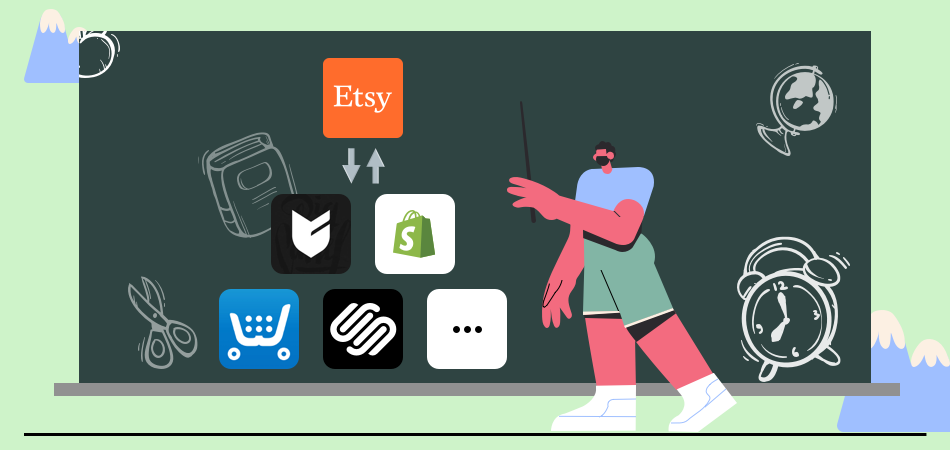
Whether you already have a Etsy store or plan to have one, it’s wise to compare Etsy with its competitors and alternatives. There might be one Etsy alternative that is better suitable for your online business, and some sites like Etsy that cost less money but offer the similar functions on Etsy. This guide will take about 10 minutes to learn 11 top Etsy alternatives you can choose from. Let’s check out:
Handcrafts are special since they are super personal than mass-produced products. A good e-commerce platform guarantees your interests in some way. If you are a beginner, Etsy might still be a good option to sell your handmade products as it provides a variety of programs out there to make it easier. However, if you’re not satisfied with Etsy or looking for some other sales channels/platforms, you won’t want to miss this comprehensive guide.
In this guide, I will provide you with 11 best alternatives and make a comparison in details. You can keep reading to decide which one is most suitable for you in 2022. Let’s start with what Etsy is, if you have known, just skip it to the next part.
| Get Started Now to Grow Your Online Business with the Best AliExpress Dropshipping Tool - DSers! |
What Is Etsy
Founded in 2005, Etsy is a marketplace where independent crafters, artists, and collectors can sell their vintage, handmade, or custom-made jewelry, clothing, home decorations, art, toys, and more.
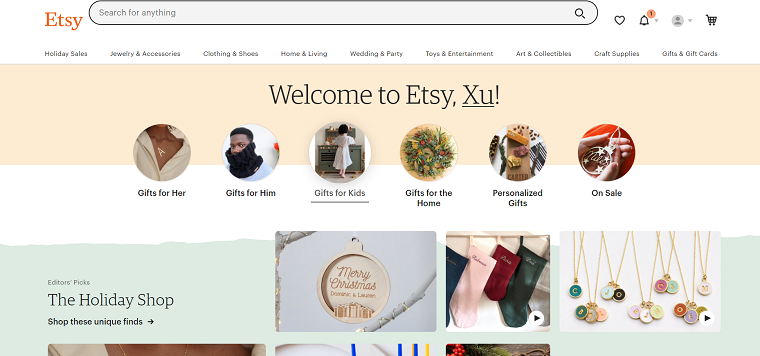
Thus, if you are one of them looking for your first customer, Etsy is an excellent marketplace here to help you. Products on this site are all manufactured, collected, curated, and sold by sellers themselves. These independent business owners are not only responsible for manufacturing their goods but managing their orders and inventory, too. Etsy is just like a middle-man, giving these creators a place to find and attract customers.
Though some Etsy store owners plan to grow their online business on Shopify, they would like to keep running their original shop on Etsy. Why? Etsy, as a popular e-commerce marketplace and platform, can still bring a high growth potential for their online business. In a nutshell, to get more traffic and sales, sellers can get started on Shopify with an Etsy integration.
Now you know what Etsy is. Let’s check out its alternatives one by one.
11 Best Etsy Alternatives You Can Choose from
You’d better explore the best Etsy alternatives for your online business since you want to maximize your profits. Here are 11 top alternatives you can check out. Let’s identify their pros and cons one by one:
1. Shopify
Shopify is a good e-commerce platform for all types of business. With plenty of shopping cart functionalities, you can sell your products through multiple channels without any hassle.
Worth mentioning here is that it has numerous powerful third-party integrations, such as DSers, the best AliExpress dropshipping solution, and MailChimp, the right plugin to apply your email marketing strategies. With them, you can start, operate and promote your store and sell products online easily.
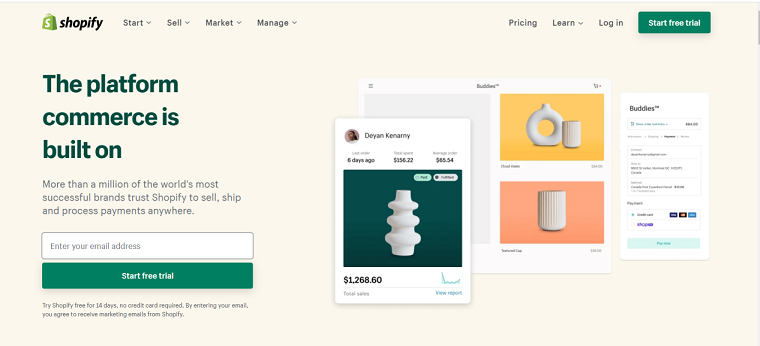
Let’s have a look at its advantages and disadvantages:
- Good for business growth: You will have a great e-commerce store with Shopify's powerful back-end editor and impressive inventory system when expanding your business.
- Multiple sales channels: Shopify allows you to sell across multiple channels, including Facebook, Instagram, Amazon, and eBay.
- Useful templates: It provides a website builder with hundreds of templates. The templates help you customize your online store with your brand's specific logos, images, videos, and text.
- Powerful app store: Shopify integrates with more than 3,000 applications and third-party extensions which can help you take your store to the next level easily.
- Not so cheap in some way: To use Shopify, you have to pay for your store's monthly operating costs, as well as transaction fees, combined with the need for additional apps.
2. Wix
Wix is a platform enabling you to track orders, accept PayPal and credit card payments. Also, it allows you to create promotional coupons and set tax and shipping rules for different locations. Wix store is also a place providing an opportunity for you to do dropshipping. To learn more about Wix dropshipping service with DSers, click here.
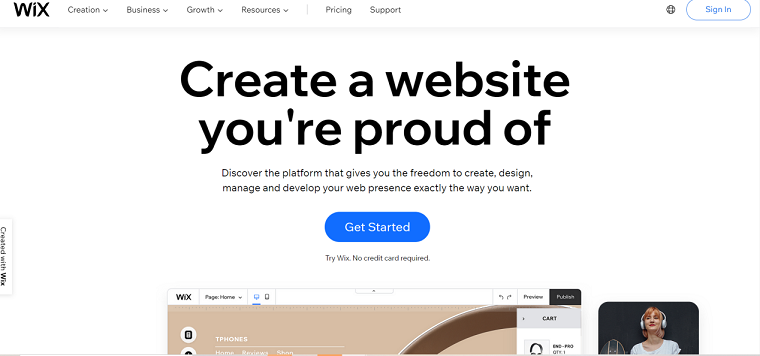
- Easy to start: Wix is set with a user-friendly theme, which is easy for beginners to start easily
- Its drag and drop theme makes you create custom storefronts at ease.
- Massive powerful integration: It has 100+ apps and integration in the app store, including the powerful AliExpress dropshipping tool - DSers
- Perfect customer support and help: Wix offers 24/7 support via email, phone, and live chat
- Limited themes: Compared to Shopify’s massive templates, Wix only provides about 800 professional looking themes, both free and paid
- Limitation: Although it has a free plan and a 14-day money-back guarantee, you only share a few features with the plan
3. Big Cartel
Big Cartel is known for its simplicity. The main dashboard ultimately includes the most basic info and status report regarding your store. The truth is that is what you expect to see when logging into your store. And it’s the simplicity that makes BigCartel a popular e-commerce platform.
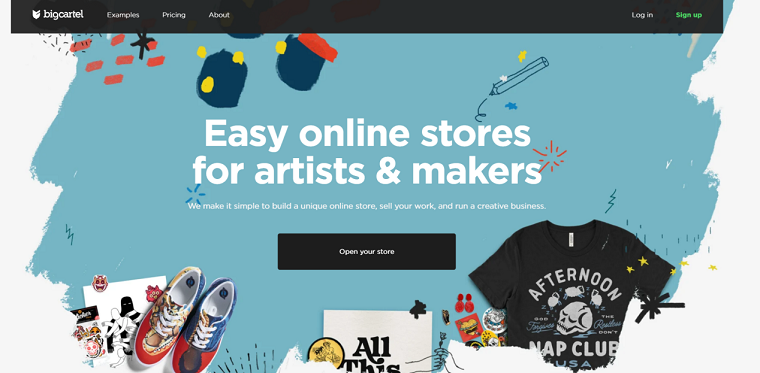
There are only a few options in the main menu, which highlights the most common actions that website owners would like to take. Not surprisingly, the panel of the added product is also very clear and pretty.
- Free to use: Big Cartel enables store owners to sell for free (up to five products), which benefits entrepreneurs with a limited budget
- Useful guidelines: For users, especially starters, it’s really great if there are many guiding tips
- Personal products: Big Cartel is good for people who sell one-off and individual products, such as artworks, and handcrafts
- Test your ideas: It’s good for makers, crafters, and artists who want to sell their handmade-goods with their own brand online
- Drive traffic yourself: Compared to Etsy, you need to have a budget or strategy for getting people to your store, which might be more time-consuming and costly
- Few themes: You have few choices when customizing your online store
- Lacks of great website features: It focuses more on simplicity, so the features always lack quality and depth
4. Bonanza
Bonanza is a platform which provides similar form and functionality of eBay. It offers a greater focus on unique items, such as arts, crafts, and collectibles. Bonanza allows you to list items for free, and the site will bill the final value fees. Makers are able to import items directly from Etsy with Bonanza, which makes it easy to get started. On Bonanza, there are many marketing and analytic tools, making it a good alternative to Etsy.
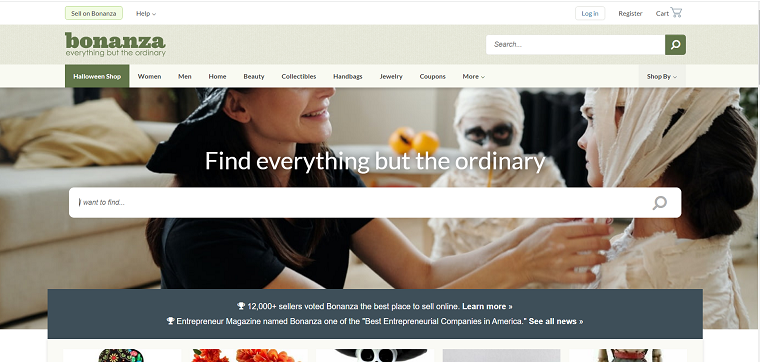
- Stand-alone online store: Compared to Etsy, Bonanza not only makes it possible for you to create a stand-alone online store but also provides you (sellers/users) with a ready customer base in its built-in market
- Reach worldwide customers: As a seller, you can access an international audience easily through Bonanza. As a buyer, you can reach unique products around the world
- Cheap: You don’t need to pay as many fees as you pay on other marketplaces, such as eBay, Amazon
- Free to list products on its website
- Smaller customer base: Compared to Etsy, the ready customer base is much smaller
- Limited design tools: It has few design tools for customizing your standalone online store and they are less user-friendly than Shopify or Zibbet
- It might be costly depending on membership and advertising preferences
5. Squarespace
Squarespace is another top alternative to Etsy, with special features to simply build a site or online store. It offers sellers a strong inventory system and powerful built-in social media tools to market their products. People who look for different features they need to sell online need to sign up for different Squarespace pricing plans.
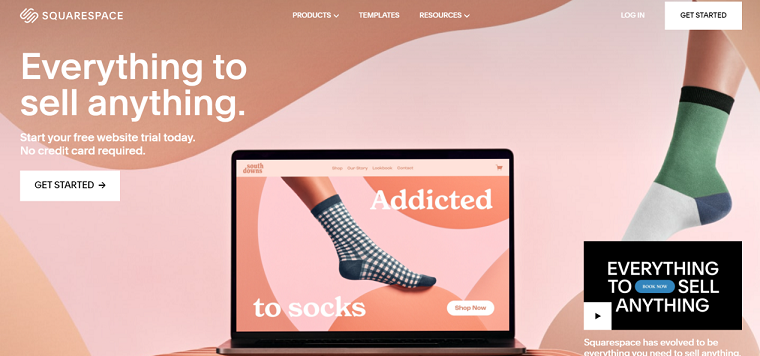
- Attractive templates: You will get plenty of professional and appealing templates since it focuses more on design
- User-friendly templates: With Squarespace’s drag-and-drop design tools, even beginners can have a well-designed site or store
- Good marketing tool: It has a great blogging tool for you to apply a content marketing strategy
- Limited integration: You can access limited add-on on the app store
- Fewer payment options: There are not as many payment options as other platforms, such as Shopify’s payment system, including Shopify Payment without paying transaction fees
- Scant sales choices: You are not allowed to sell through multiple channels
6. Ecwid
The next top alternative is Ecwid. The free feature and simplicity make Ecwid appealing for new e-commerce entrepreneurs. So are Etsy hand-makers who are looking to explore their store. There is no need for you to know how to code or design when using it. It provides users with valuable features like centralized inventory, order management, and pricing. With these features, Ecwid is more advanced than Etsy.
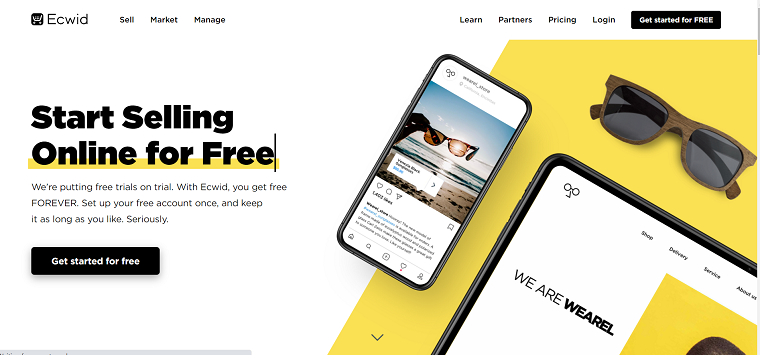
- Test business idea: It allows sellers to sell across various marketplaces, commerce channels, and digital platforms, which is good for trying out business ideas
- Small business: It’s good for people who want to start small when launching their online store
- Hard to meet growth need: Ecwid has an “instant site”, but it’s difficult to find impressive features that meet your needs to scale your store.
7. Amazon Handmade
As a retail giant that has transformed the consumer goods market, Amazon is decidedly contrary to what most creative entrepreneurs imagine when they sell products and services. Amazon is well-known for selling all things fast and cheap. It has been a good Etsy alternative since its handmade marketplace first launched. The Amazon Handmade marketplace allows people to sell their handicrafts and artworks with this retail giant.
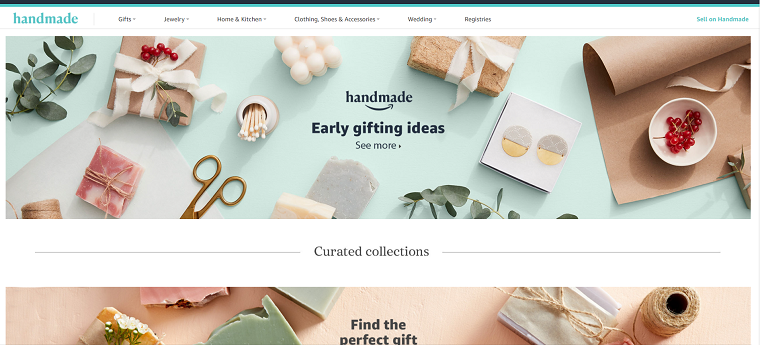
- More customers: You might get more potential customers when selling on Amazon since it is the first-stop option for buyers almost everywhere
- Fulfillment center: When selling on Amazon, you can get additional benefits by using its FBA( Fulfilled by Amazon) program
- Powerful ads: It provides you Amazon sponsored ads, which brings more traffic to your store and products
- The monthly fee can be waived: You have to pay $39.99 per month membership fee, but as long as you are not selling more than 40 products in categories other than Handmade categories, the monthly fee can be waived
- Fierce competition: Products published through Amazon Handmade appear with the full Amazon storefront, rather than as a stand-alone website. Thus, you will face fierce competition from cheap manufacturing, mass-produced alternatives.
- Additional fee: All Amazon Handmade sellers also need to pay a 15% commission per transaction
8. IndieMade
If you are entrepreneurs who want more freedom to control your store and products selling, IndieMade can meet your needs well. While it doesn’t provide the benefits of an online marketplace, such as Etsy, Amazon. With its store-building options and ability to connect to your Etsy shop, IndieMade gives more opportunities to control more of the selling process, without charging substantial fees. Moreover, IndieMade provides you massive e-commerce features, such as an integrated shopping cart, as well as other content like audio, video, and a blog with IndieMade.
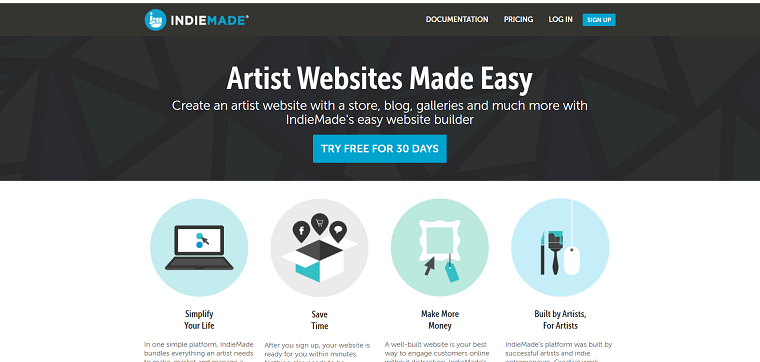
- Greater flexibility: With IndieMade, online sellers can create and customize their store freely and flexibly
- Impressive tools: It offers tools such as integrated analytics, reporting, SEO, and promotional tools
- Cheap: You can use its online shopping cart, as well as file storage, bandwidth, and an SSL certificate for no additional cost
- Limitation: To use IndieMade, you have to create an online store, since it’s not a curated marketplace and anyone can sell anything legal using their platform.
9. Zibbet
If you are artists, entrepreneurs, and creators who are eager to promote your products across multiple sales channels, Zibbet is the first and right platform that you can choose to start in 2022. Zibbet is able to synchronize information from all of your sales channels, making it easy for you to track:
- Sales you have made
- Your stock levels
- Remaining inventory in each store
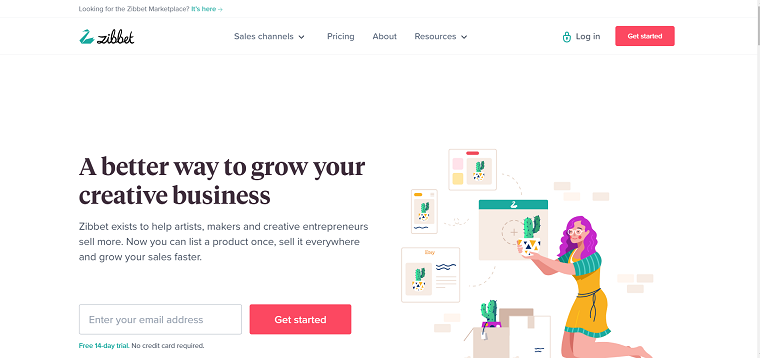
- Robust tools: Zibbet offers you robust tools you can get assistance with, such as order management, packaging, shipping, data tracking, and analytics, and even importing information from an Etsy website
- Store control: Sellers selling handmade-only products have both the flexibility and control of a stand-alone, customizable website
- Little to lose: Zibbet doesn’t require listing fees and a commission fee
- Potential products: Sellers might get the ready-to-purchase audience in the Zibbet marketplace easily
- Smaller reach: Zibbet is a newer and growing platform, so it might be difficult for it to get a larger total reach than Etsy
- Improvement of buyer experience: Zibbet now is still working hard to improve the buyer experience
10. Storenvy
Storenvy marketplace mainly focuses on hand-selected as well as handmade goods. The marketplace features small, indie retailers who provide high-quality, unique products. Catering specifically to a younger demographic, Storenvy is ultimately aimed at young people and is a great choice for sellers in jewelry, vintage fashion, or children's product niches.
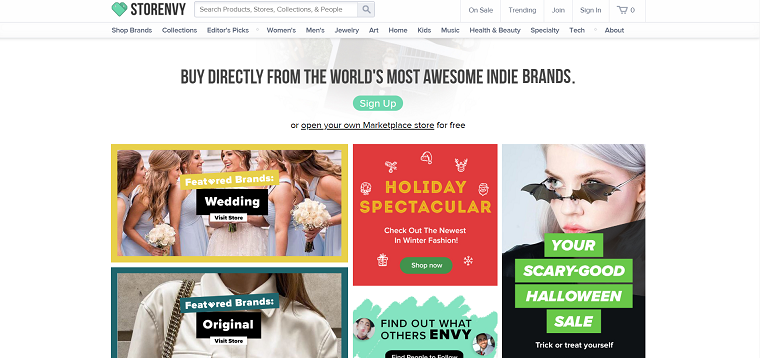
- Cost-effective: With the ability to create a free online store and sell on its market, Storenvy provides you with a cost-effective way to access multiple sales channels
- Advertisement: Storenvy allows you to take advantage of your online store and social market to promote your products
- Limited demographic: Storenvy only caters to young people. Thus, if your product is not in these categories, it might be difficult to succeed with it
11. ArtFire
Founded in 2008 by John Jaobs, and super similar to Storenvy, ArtFire is a place that caters to a specific demographic. It’s a marketplace that lets craftspeople and vintage collectors sell items to customers worldwide.
As an ArtFire store owner, you also can participate in the online community beyond just selling things. For example, ArtFire enables sellers to share feedback with other sellers in online forums, interact with customers, and make the website more engaging in the process.
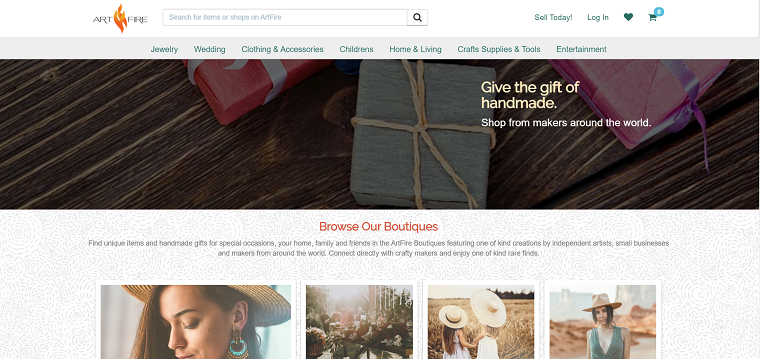
- Various options for business: ArtFire allows customers to filter searches by business size, so if customers want to truly support small businesses, ArtFire is exactly what they look for
- Better customer support: It provides a toll-free phone number that people can talk to a real person
- Promotional fees: You have to pay a lot to sell products in commercial categories other than handmade
- Limited options of customization and promotion
Final Word
There are plenty of Etsy alternatives you can choose from to start your online handmade business in 2022. You might be confused about which one is the best. The answer is simple: you must find the best one by your own according to your business type and scale. With this completed comparison, you already know well about the 11 alternatives. I hope you have got what you want. Thus, no matter what you are going to sell, choose one to try out your brilliant business idea from now. Good luck to you.












 Company
Company
 Why Choose DSers
Why Choose DSers
 Blog
Blog
 Help Center
Help Center




 Live Chat
Live Chat